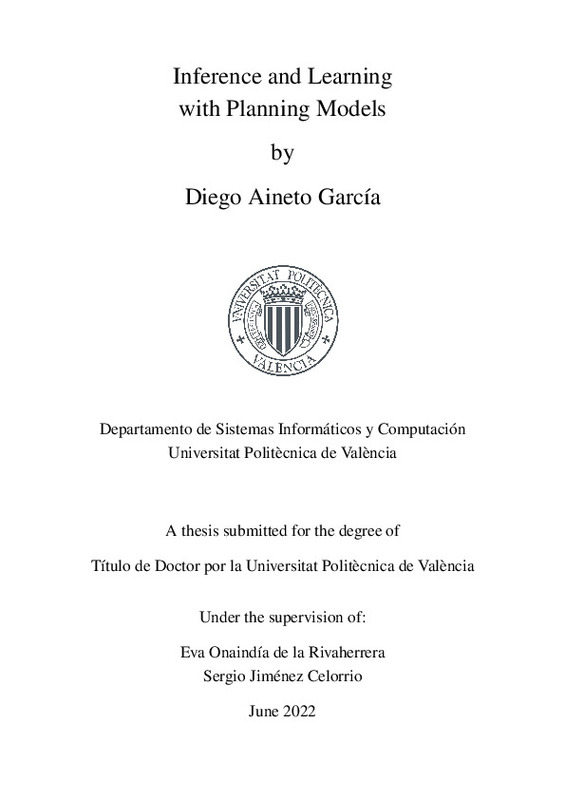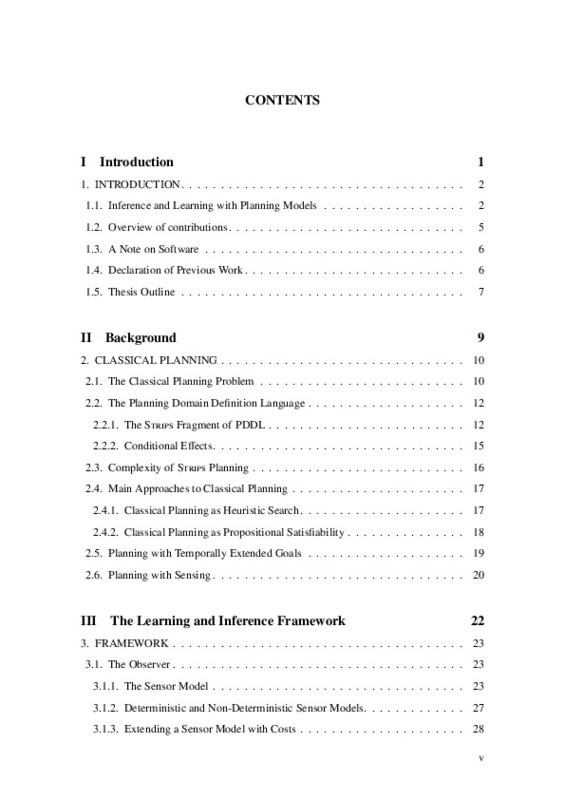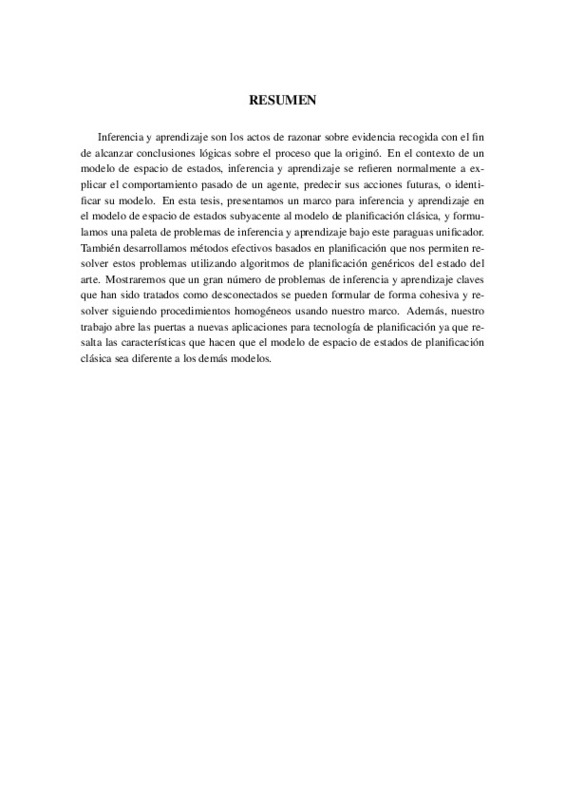- RiuNet repositorio UPV
- :
- Investigación
- :
- Tesis doctorales
- :
- Ver ítem
JavaScript is disabled for your browser. Some features of this site may not work without it.
Buscar en RiuNet
Listar
Mi cuenta
Estadísticas
Ayuda RiuNet
Admin. UPV
Inference and Learning with Planning Models
Mostrar el registro sencillo del ítem
Ficheros en el ítem
| dc.contributor.advisor | Jiménez Celorrio, Sergio
|
es_ES |
| dc.contributor.advisor | Onaindia de la Rivaherrera, Eva
|
es_ES |
| dc.contributor.author | Aineto García, Diego
|
es_ES |
| dc.date.accessioned | 2022-09-06T12:53:38Z | |
| dc.date.available | 2022-09-06T12:53:38Z | |
| dc.date.created | 2022-07-01 | |
| dc.date.issued | 2022-09-02 | es_ES |
| dc.identifier.uri | http://hdl.handle.net/10251/185355 | |
| dc.description.abstract | [ES] Inferencia y aprendizaje son los actos de razonar sobre evidencia recogida con el fin de alcanzar conclusiones lógicas sobre el proceso que la originó. En el contexto de un modelo de espacio de estados, inferencia y aprendizaje se refieren normalmente a explicar el comportamiento pasado de un agente, predecir sus acciones futuras, o identificar su modelo. En esta tesis, presentamos un marco para inferencia y aprendizaje en el modelo de espacio de estados subyacente al modelo de planificación clásica, y formulamos una paleta de problemas de inferencia y aprendizaje bajo este paraguas unificador. También desarrollamos métodos efectivos basados en planificación que nos permiten resolver estos problemas utilizando algoritmos de planificación genéricos del estado del arte. Mostraremos que un gran número de problemas de inferencia y aprendizaje claves que han sido tratados como desconectados se pueden formular de forma cohesiva y resolver siguiendo procedimientos homogéneos usando nuestro marco. Además, nuestro trabajo abre las puertas a nuevas aplicaciones para tecnología de planificación ya que resalta las características que hacen que el modelo de espacio de estados de planificación clásica sea diferente a los demás modelos. | es_ES |
| dc.description.abstract | [CA] Inferència i aprenentatge són els actes de raonar sobre evidència arreplegada a fi d'aconseguir conclusions lògiques sobre el procés que la va originar. En el context d'un model d'espai d'estats, inferència i aprenentatge es referixen normalment a explicar el comportament passat d'un agent, predir les seues accions futures, o identificar el seu model. En esta tesi, presentem un marc per a inferència i aprenentatge en el model d'espai d'estats subjacent al model de planificació clàssica, i formulem una paleta de problemes d'inferència i aprenentatge davall este paraigua unificador. També desenrotllem mètodes efectius basats en planificació que ens permeten resoldre estos problemes utilitzant algoritmes de planificació genèrics de l'estat de l'art. Mostrarem que un gran nombre de problemes d'inferència i aprenentatge claus que han sigut tractats com desconnectats es poden formular de forma cohesiva i resoldre seguint procediments homogenis usant el nostre marc. A més, el nostre treball obri les portes a noves aplicacions per a tecnologia de planificació ja que ressalta les característiques que fan que el model d'espai d'estats de planificació clàssica siga diferent dels altres models. | es_ES |
| dc.description.abstract | [EN] Inference and learning are the acts of reasoning about some collected evidence in order to reach a logical conclusion regarding the process that originated it. In the context of a state-space model, inference and learning are usually concerned with explaining an agent's past behaviour, predicting its future actions or identifying its model. In this thesis, we present a framework for inference and learning in the state-space model underlying the classical planning model, and formulate a palette of inference and learning problems under this unifying umbrella. We also develop effective planning-based approaches to solve these problems using off-the-shelf, state-of-the-art planning algorithms. We will show that several core inference and learning problems that previous research has treated as disconnected can be formulated in a cohesive way and solved following homogeneous procedures using the proposed framework. Further, our work opens the way for new applications of planning technology as it highlights the features that make the state-space model of classical planning different from other models. | es_ES |
| dc.description.sponsorship | The work developed in this doctoral thesis has been possible thanks to the FPU16/03184 fellowship that I have enjoyed for the duration of my PhD studies. I have also been supported by my advisors’ grants TIN2017-88476-C2-1-R, TIN2014-55637-C2-2-R-AR, and RYC-2015-18009. | es_ES |
| dc.format.extent | 150 | es_ES |
| dc.language | Inglés | es_ES |
| dc.publisher | Universitat Politècnica de València | es_ES |
| dc.rights | Reserva de todos los derechos | es_ES |
| dc.subject | Inference | es_ES |
| dc.subject | Automatic planning | es_ES |
| dc.subject | Temporal inference | es_ES |
| dc.subject | Learning models | es_ES |
| dc.subject | Inferencia | es_ES |
| dc.subject | Aprendizaje | es_ES |
| dc.subject | Planificación automática | es_ES |
| dc.subject | Inferencia temporal | es_ES |
| dc.subject | Modelos de aprendizaje | es_ES |
| dc.subject.classification | LENGUAJES Y SISTEMAS INFORMATICOS | es_ES |
| dc.title | Inference and Learning with Planning Models | es_ES |
| dc.type | Tesis doctoral | es_ES |
| dc.identifier.doi | 10.4995/Thesis/10251/185355 | es_ES |
| dc.relation.projectID | info:eu-repo/grantAgreement/MINECO//RYC-2015-18009/ES/RYC-2015-18009/ | es_ES |
| dc.relation.projectID | info:eu-repo/grantAgreement/MINECO//TIN2014-55637-C2-2-R/ES/GESTION DE METAS PARA AUTONOMIA A LARGO PLAZO EN CIUDADES INTELIGENTES/ | es_ES |
| dc.relation.projectID | info:eu-repo/grantAgreement/AEI/Plan Estatal de Investigación Científica y Técnica y de Innovación 2013-2016/TIN2017-88476-C2-1-R/ES/RECONOCIMIENTO DE ACTIVIDADES Y PLANIFICACION AUTOMATICA PARA EL DISEÑO DE ASISTENTES INTELIGENTES/ | es_ES |
| dc.rights.accessRights | Abierto | es_ES |
| dc.contributor.affiliation | Universitat Politècnica de València. Departamento de Sistemas Informáticos y Computación - Departament de Sistemes Informàtics i Computació | es_ES |
| dc.description.bibliographicCitation | Aineto García, D. (2022). Inference and Learning with Planning Models [Tesis doctoral]. Universitat Politècnica de València. https://doi.org/10.4995/Thesis/10251/185355 | es_ES |
| dc.description.accrualMethod | TESIS | es_ES |
| dc.type.version | info:eu-repo/semantics/acceptedVersion | es_ES |
| dc.relation.pasarela | TESIS\12681 | es_ES |
| dc.contributor.funder | Agencia Estatal de Investigación | es_ES |
| dc.contributor.funder | Ministerio de Economía y Competitividad | es_ES |
Este ítem aparece en la(s) siguiente(s) colección(ones)
-
Tesis doctorales [5389]










